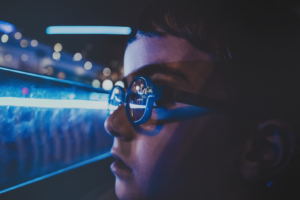
What is blue light?
Blue light is a type of light that is emitted by screens on devices such as phones, tablets, and computers. It is also present in the sunlight, and is responsible for making the sky appear blue during the day.
Why is blue light harmful to our eyes?
While blue light is necessary for maintaining a healthy sleep-wake cycle and keeping our bodies alert, it can also have negative effects on our eyes. Studies have shown that prolonged exposure to blue light can lead to digital eye strain, which can cause symptoms such as dry eyes, blurred vision, and headaches.
In addition, blue light has been linked to an increased risk of developing age-related macular degeneration, a condition that can lead to vision loss. This is because blue light has a shorter wavelength and higher energy than other types of light, which makes it more damaging to the delicate cells in the retina.

How can we protect our eyes from blue light?
There are a few steps you can take to protect your eyes from harmful blue light:

- Reduce your screen time: Try to limit the amount of time you spend looking at screens, especially at night.
- Use blue light filters: Many devices, including phones and computers, offer built-in blue light filters that can help reduce the amount of blue light emitted by the screen.
- Wear blue light blocking glasses: These glasses have special lenses that block out harmful blue light, helping to protect your eyes from digital eye strain and other negative effects.
- Take breaks: Make sure to take frequent breaks from screens to give your eyes a chance to rest and recover.
How to choose blue light blocking glasses
If you decide to wear blue light blocking glasses, there are a few things you should consider when choosing a pair:
- Choose glasses with a high blue light blocking percentage: Look for glasses that block out at least 90% of blue light.
- Choose glasses with a yellow or orange tint: These tints have been shown to be the most effective at blocking blue light.
- Choose glasses with anti-reflective coating: This will help to reduce glare and eye strain when using screens.
- Consider your needs: Think about how you will be using the glasses and choose a style that is comfortable and suitable for your needs.
In conclusion
Blue light is an important part of our daily lives, but it’s important to be aware of the potential risks it can pose to our eyes and our sleep. By taking steps to reduce your screen time, using blue light filters and glasses, and taking regular breaks, you can help protect your eyes and maintain good eye health.